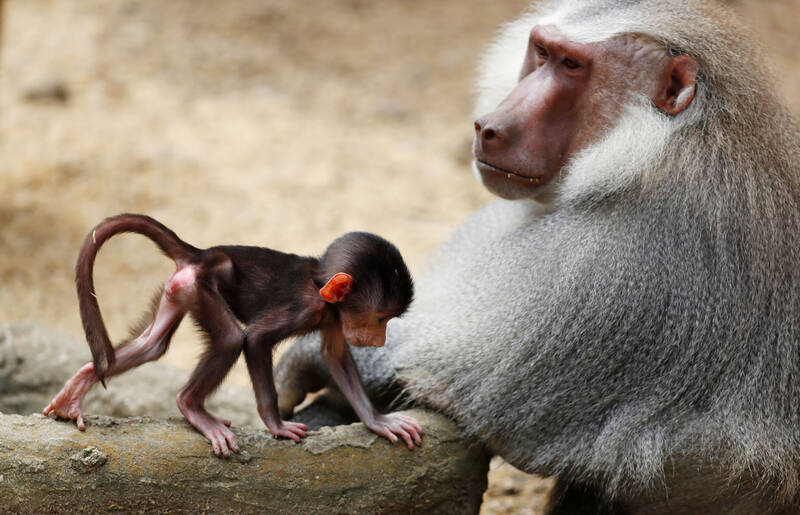If male baboons were subject to the same kind of cultural commentary as humans, the phrase “deadbeat dads” might be called for, such is the primate’s relatively limited involvement in raising their young.
But a study suggests that even their little effort might go a long way, with female baboons who experience a stronger relationship with their fathers when young tending to live longer as adults.
“Among primates, humans are really unusual in how much dads contribute to raising offspring,” said Professor Elizabeth Archie, co-author of the research from the University of Notre Dame in Indiana.

Photo: EPE
“Most primates’ dads really don’t contribute very much, but what the baboons are showing us is that maybe we’ve been under-appreciating dads in some species of primates.”
In the journal Proceedings of the Royal Society B, Archie and colleagues reported how they studied wild baboons in Kenya, focusing on 216 females fathered by 102 males, as confirmed by genetic data.
The team studied the frequency of grooming interactions between fathers and daughters during the first four years of the females’ lives, as well as recording the total number of days fathers and daughters lived in the same group over that period. They then tracked how long the daughters lived as adults.
Archie said the team focused on female offspring because males often moved to other social groups as adults, making it difficult to track how long they live.
The researchers found that female baboons who, during the first four years of their life, lived in the same group as their fathers for longer and spent more time grooming with them, lived two to four years longer as adults than those who experienced weaker relationships with their dads. If only one of the two occurred, an increase of about two to three years was found, Archie added.
“A typical lifespan for a female baboon, if she reaches adulthood, [is] 18 years,” she said, noting that females tended to have offspring every 18 months or so. “So living two to three years longer would allow her time potentially to have another kid.”
That, Archie added, might provide an incentive for fathers, given males were less able to fight others for mates as they get older.
“They can no longer compete for females, but what they can do is help their daughters,” said Archie. “And if their daughters live a little bit longer, then the fathers will pass on more genes and have higher fitness because their daughters are living longer and having more kids.”
The researchers found that strong relationships between young females and adult males in general, or with males who were not their fathers, was not associated with an increase in females’ survival as adults.
Archie said it was not yet clear why the strength of early-life relationships between daughters and fathers might affect females’ survival as adults, but said a number of mechanisms could be at play.
Among them, she suggested fathers were more likely to step in should their daughters get into fights, or by sheer intimidation create a “zone of safety” around them so they were less likely to have food stolen or be injured or harassed — helping them grow into healthier adults.
But, Archie noted, there was another possibility.
“Maybe it is just that healthy daughters have good relationships with their fathers, and they also live longer,” she said.

The unexpected collapse of the recall campaigns is being viewed through many lenses, most of them skewed and self-absorbed. The international media unsurprisingly focuses on what they perceive as the message that Taiwanese voters were sending in the failure of the mass recall, especially to China, the US and to friendly Western nations. This made some sense prior to early last month. One of the main arguments used by recall campaigners for recalling Chinese Nationalist Party (KMT) lawmakers was that they were too pro-China, and by extension not to be trusted with defending the nation. Also by extension, that argument could be

Aug. 4 to Aug. 10 When Coca-Cola finally pushed its way into Taiwan’s market in 1968, it allegedly vowed to wipe out its major domestic rival Hey Song within five years. But Hey Song, which began as a manual operation in a family cow shed in 1925, had proven its resilience, surviving numerous setbacks — including the loss of autonomy and nearly all its assets due to the Japanese colonial government’s wartime economic policy. By the 1960s, Hey Song had risen to the top of Taiwan’s beverage industry. This success was driven not only by president Chang Wen-chi’s

Last week, on the heels of the recall election that turned out so badly for Taiwan, came the news that US President Donald Trump had blocked the transit of President William Lai (賴清德) through the US on his way to Latin America. A few days later the international media reported that in June a scheduled visit by Minister of National Defense Wellington Koo (顧立雄) for high level meetings was canceled by the US after China’s President Xi Jinping (習近平) asked Trump to curb US engagement with Taiwan during a June phone call. The cancellation of Lai’s transit was a gaudy

The centuries-old fiery Chinese spirit baijiu (白酒), long associated with business dinners, is being reshaped to appeal to younger generations as its makers adapt to changing times. Mostly distilled from sorghum, the clear but pungent liquor contains as much as 60 percent alcohol. It’s the usual choice for toasts of gan bei (乾杯), the Chinese expression for bottoms up, and raucous drinking games. “If you like to drink spirits and you’ve never had baijiu, it’s kind of like eating noodles but you’ve never had spaghetti,” said Jim Boyce, a Canadian writer and wine expert who founded World Baijiu Day a decade